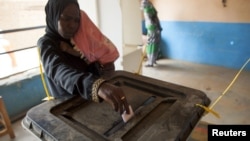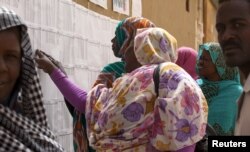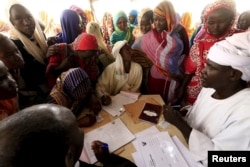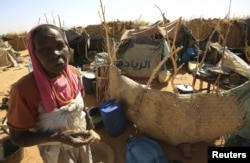Voting is underway this week in Sudan's Darfur region on a controversial referendum over whether to unify Darfur’s five states into a single administrative unit. The exclusion of voters displaced by fighting since 2003 has many questioning the credibility of the poll.
Sudan’s government has carved up the Darfur region twice, in 1994 and 2012, creating five states there. Khartoum is in favor of preserving the status quo.
But proponents of unification say it will give Darfur more autonomy and influence, addressing a key driver of conflict since 2003. Rebel groups have long said Darfur is economically and politically marginalized, as well as facing daily insecurity.
Still, many in Darfur say they aren’t voting this week.
“I don’t see people enthusiastic in order to vote, It seems that referendum is a boycott by a majority of the people in Darfur,” said a man who lives in Al-Fashir, the capital of North Darfur state.
Internally displaced people
The government says internally displaced people (IDPs) living in Darfur will be able to vote. However, people displaced outside the region or the country are not eligible.
According to the government, 3.5 million people are registered to vote. Analysts dispute that number, citing wide discrepancies in the past between government and U.N. figures on IDP’s.
The United States says voter registration in IDP camps was “inadequate” and that the poll cannot be considered credible and will undermine Darfur's peace process.
And some of the rebels, who are boycotting due to ongoing fighting, say while the displaced are being excluded, the government is mobilizing its supporters in the larger towns to vote.
Bushara Manago is with the Mini Minawi faction of the Sudan Liberation Movement army.
“You know, how you can conduct this referendum…more than three million people in IDP camps, and refugees and the war is still going on. The people, no freedoms of expression,” said Manago.
An additional 138,000 people have fled their homes since mid-January because of renewed fighting between government troops and rebel forces loyal to Abdul Wahid.
2011 peace agreement
Sudan’s Information Minister Ahmed Bilal Osman told VOA’s Daybreak Africa that his government was upholding one of the terms of the 2011 peace agreement by organizing the referendum.
But John Hursh, a policy analyst at the Enough Project, a Washington-based atrocity prevention policy group, disagreed.
“It’s really unclear to me how following through on a peace agreement that is widely considered illegitimate as well is going to do anything to move this situation forward,” he said.
Many consider that peace deal to be incomprehensive and poorly implemented.
Rosalind Marsden is an associate fellow at Chatham House and a former British ambassador to Sudan.
“For the government, what they hope is to send a signal that by holding the referendum, the conflict in Darfur is over, and I think they then hope they will be able to say the time has come to close the camps for the internally displaced people and that UNAMID, the U.N. African Union peacekeeping mission, should leave. But those who feel that Darfur is still very insecure, are very concerned that the referendum could in fact raise tensions,” said Marsden.
The U.N. says more than 300,000 people have died in Darfur since 2003, when rebels there launched a rebellion citing discrimination and marginalization. The government responded by forming militias known as the Janjaweed, that caused chaos in the region.
Sudanese president Omar al-Bashir is wanted by the International Criminal Court for charges of crimes against humanity, war crimes, and genocide in Darfur.
Polling in the referendum ends Wednesday.







